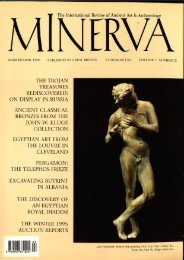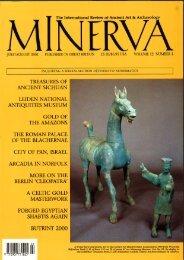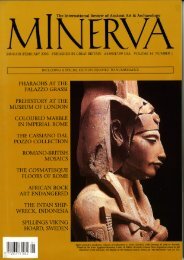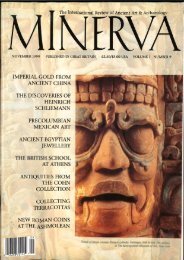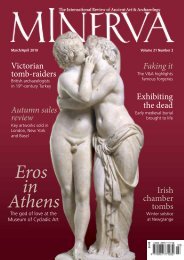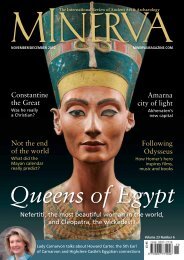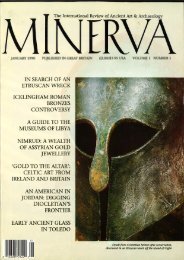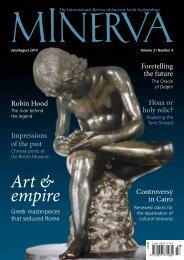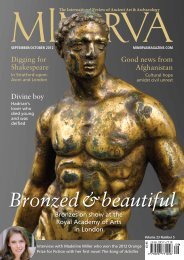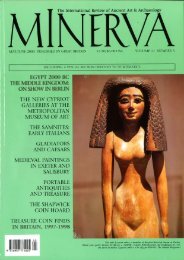Alexander in Amsterdam - Minerva
Alexander in Amsterdam - Minerva
Alexander in Amsterdam - Minerva
You also want an ePaper? Increase the reach of your titles
YUMPU automatically turns print PDFs into web optimized ePapers that Google loves.
Ch<strong>in</strong>ese culture<br />
James Beresford<br />
takes a new look at<br />
the Anglo-French<br />
military campaign of<br />
1860 that ended with<br />
the destruction of<br />
one of Ch<strong>in</strong>a’s most<br />
important cultural sites<br />
ord Elg<strong>in</strong> ordered the burn<strong>in</strong>g<br />
of part of the Summer Palace.<br />
It was given to the flames on<br />
the 18 th and 19 th of October.<br />
The clouds of smoke, driven by the w<strong>in</strong>d,<br />
hung like a vast pall over Pek<strong>in</strong>g. From<br />
an artistic po<strong>in</strong>t of view it was an act<br />
of vandalism: from that of sound policy<br />
it was statesmanlike’ (Stanley Lane-<br />
Poole, Sir Harry Parkes <strong>in</strong> Ch<strong>in</strong>a, 1901,<br />
p. 250).<br />
It is 150 years s<strong>in</strong>ce Brita<strong>in</strong> and<br />
France were engaged <strong>in</strong> the conflict<br />
aga<strong>in</strong>st Q<strong>in</strong>g Ch<strong>in</strong>a that has become<br />
known as the Second Opium War.<br />
Scarcely remembered by the populations<br />
of the two European countries,<br />
the war still has great significance for<br />
the Ch<strong>in</strong>ese, who regard it as symbolic<br />
of their national humiliation at<br />
the hands of imperialistic Western<br />
powers. The def<strong>in</strong><strong>in</strong>g moment of the<br />
Anglo-French campaign was the day<br />
British forces torched the Summer<br />
Palace, Yuanm<strong>in</strong>gyuan, ‘The Gardens<br />
of Perfect Brightness’, one of the most<br />
beautiful architectural complexes ever<br />
created (Fig 2).<br />
Constructed <strong>in</strong> the early 18 th century,<br />
the Summer Palace was a vast<br />
collection of build<strong>in</strong>gs, set with<strong>in</strong><br />
landscaped parkland 8km north-west<br />
of Beij<strong>in</strong>g (Fig 3). As the Rev R.J.L.<br />
McGee, Chapla<strong>in</strong> to the British Army<br />
dur<strong>in</strong>g the 1860 campaign, would<br />
2<br />
36<br />
Photo: Mlogic.<br />
Sack of the<br />
Summer Palace<br />
Fig 1. Reconstructed<br />
pavilion <strong>in</strong> the<br />
Elegant Spr<strong>in</strong>g<br />
Garden, Summer<br />
Palace.<br />
Fig 2. Sketch by<br />
Godefroy Durand<br />
of the loot<strong>in</strong>g of<br />
the Summer Palace<br />
<strong>in</strong> 1860. The zodiac<br />
founta<strong>in</strong> decorated<br />
with the 12 bronze<br />
figures, is <strong>in</strong> the<br />
centre, between the<br />
curv<strong>in</strong>g stairs.<br />
recall: ‘If you can, you must imag<strong>in</strong>e a<br />
vast labyr<strong>in</strong>th of picturesque rocks and<br />
noble timber, lakes and streams, summer-houses<br />
roofed with porcela<strong>in</strong> of<br />
the imperial yellow, theatres and their<br />
store-houses… temples more numerous<br />
still… filled with works of Ch<strong>in</strong>ese<br />
art of great age, beauty, and value.’<br />
(How We Got to Pek<strong>in</strong>, 1862, p. 211)<br />
(Figs 1, 3, 4).<br />
The numerous build<strong>in</strong>gs of the palace<br />
conta<strong>in</strong>ed countless artworks from<br />
much earlier periods of Ch<strong>in</strong>ese history,<br />
<strong>in</strong>clud<strong>in</strong>g some of Ch<strong>in</strong>a’s oldest<br />
and most precious manuscripts,<br />
housed <strong>in</strong> The Wenyuan Hall (Hall of<br />
Literary Profundity). As French writer<br />
Victor Hugo would remark: ‘With all<br />
its treasures, Notre Dame <strong>in</strong> Paris is no<br />
match for Yuan-m<strong>in</strong>g-yuan, that enormous<br />
and magnificent museum <strong>in</strong> the<br />
East.’ The burn<strong>in</strong>g by British troops<br />
swept away virtually all this vast and<br />
remarkable collection of palaces, while<br />
the loot<strong>in</strong>g that preceded the firestorm<br />
led to the destruction of many treasures,<br />
or their removal to Europe. Such<br />
was the loss to Ch<strong>in</strong>ese culture that the<br />
torch<strong>in</strong>g of the Summer Palace can be<br />
likened to the demolition of the House<br />
of Wisdom <strong>in</strong> Baghdad by the Mongols<br />
<strong>in</strong> 1258, the burn<strong>in</strong>g of the library of<br />
Alexandria by Julius Caesar <strong>in</strong> 48 BC,<br />
or Q<strong>in</strong> Shi Huang’s destruction of the<br />
classic works produced by the Hundred<br />
Schools of Thought <strong>in</strong> 221 BC.<br />
For the Ch<strong>in</strong>ese people, the burn<strong>in</strong>g<br />
of the Summer Palace was an act<br />
of willful destruction, driven primarily<br />
by capitalist desire to cow the Ch<strong>in</strong>ese<br />
and open up of the country to Western<br />
commerce; a trade centered on opium,<br />
which ‘turned a British deficit with<br />
Ch<strong>in</strong>a <strong>in</strong>to a substantial surplus…<br />
provid<strong>in</strong>g massive profits for London<br />
companies and substantial revenues<br />
for the state’ (John News<strong>in</strong>ger, p. 125).<br />
The man lead<strong>in</strong>g the British diplomatic<br />
pressure on Ch<strong>in</strong>a <strong>in</strong> 1860 would<br />
tend to agree with this judgement.<br />
James Bruce (1811–1863) was the 8 th<br />
Earl of Elg<strong>in</strong> (Fig 6), whose father had<br />
become <strong>in</strong>famous at the start of the<br />
century by remov<strong>in</strong>g a large portion<br />
of the marbles from the Parthenon <strong>in</strong><br />
Athens. In his letters and diaries, Elg<strong>in</strong><br />
would write with bitterness that, ‘<strong>in</strong><br />
our relations with these Ch<strong>in</strong>ese we<br />
have acted scandalously’, and would<br />
describe his deal<strong>in</strong>gs with Ch<strong>in</strong>ese officials<br />
as ‘fight<strong>in</strong>g, bully<strong>in</strong>g and gett<strong>in</strong>g<br />
the poor commissioners to concede<br />
one po<strong>in</strong>t after another’.<br />
The burn<strong>in</strong>g of Yuanm<strong>in</strong>gyuan cont<strong>in</strong>ues<br />
to act as a nationalistic rally<strong>in</strong>g<br />
call for the population of modern<br />
Ch<strong>in</strong>a. The rul<strong>in</strong>g Communist Party is<br />
eager to promote the need for strength<br />
and unity and so avoid the weakness<br />
of the past, when the country was at<br />
the mercy of foreign <strong>in</strong>vaders. Ch<strong>in</strong>ese<br />
history textbooks, films and television<br />
M<strong>in</strong>erva September/October 2010



